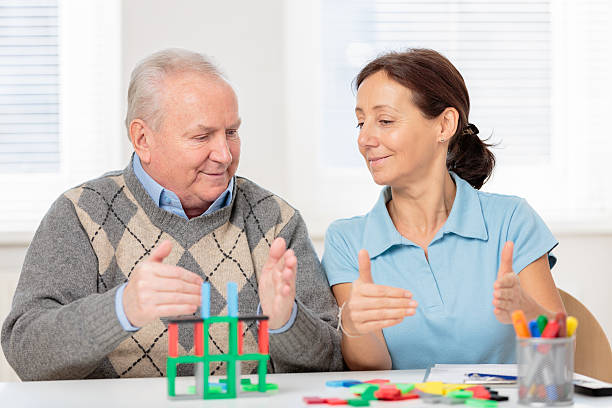Introduction

For people with Parkinson's disease, exercise can be a powerful ally in the fight against its physical and mental symptoms. According to research, regular physical activity is important for people with chronic conditions as it can improve motor skills, reduce fatigue, and boost cognitive performance.
In this blog post, we'll explore how exercise can help strengthen brain health among Parkinson's patients - from improving their physical abilities to enhancing the function of their brains through increased oxygen flow and improved chemical balance.
Overview of Parkinson's Disease
The central nervous system is affected by Parkinson's disease, a progressive neurological disorder. It impairs movement and coordination. Symptoms include tremors, stiffness, slowness of movements, balance, gait issues, difficulty speaking and swallowing, and depression. Many treatments are available to manage the symptoms, but no cure exists.
How Exercise Improves Brain Health in Parkinson's Patients
Exercise has been shown to help improve the mobility and physical functioning of Parkinson's patients, but its effects go beyond the physical. Exercise can also reduce cognitive decline associated with the disease. Studies have found that regular exercise can increase blood flow in the brain, which helps to maintain healthy levels of neurotransmitters like dopamine, serotonin, and norepinephrine, which are essential for cognitive function. Exercise also improves balance and coordination, which helps to reduce the risk of falls among Parkinson's patients. Additionally, exercise can help to reduce depression and improve the overall quality of life in those affected by the disease.
Exercises focusing on balance, strength training, flexibility, and aerobic activities have significantly benefited Parkinson's patients. Working with a physical therapist can help tailor a program to each patient's needs. Exercise programs should be tailored to an individual's capabilities and eased gradually to reduce the risk of injury.
The connection between exercise and brain health in Parkinson's patients is clear. Exercise can help reduce the physical and cognitive decline often associated with the disease while improving quality of life. Before starting any workout routine, patients should consult their doctor. With proper management, Parkinson's patients can lead active and fulfilling lives.
The Benefits of Exercise for Cognitive Function
It has been proven that exercise can help manage the symptoms of Parkinson's disease, improve cognitive function, enhance the quality of life, reduce stress, and improve emotional health. Therefore, exercise is essential for individuals dealing with this condition. The connection between exercise and brain health in Parkinson's patients is significant; regular physical activity can help slow degenerative changes in the brain and improve cognitive performance.
Physical exercise has been linked to improved cognition in Parkinson's patients, including better executive functioning, improved recall and learning speed, enhanced visual-spatial processing, and increased concentration. Exercise can even reduce anxiety and depression in many Parkinson's patients. In addition to these cognitive benefits, physical activity can help alleviate the disease's symptoms, such as tremors and stiffness.
The human brain is complex and plastic, meaning regular exercise can change its structure. Exercise benefits mood and functioning and can help preserve existing neural connections in the brain against degeneration caused by Parkinson's disease.
Tips for Getting Started with an Exercise Routine

Exercise is important in maintaining and improving brain health for people with Parkinson's. Regular physical activity can help manage symptoms such as walking difficulties, balance problems, fatigue, and depression.
Here are some tips to get started with a safe and effective exercise routine:
• Talk to your doctor before starting any new fitness regime – they can help you decide which activity is best for you.
• Try activities suitable for your fitness level and Parkinson's symptoms, such as low-impact aerobics, swimming, or walking.
• Start slowly and gradually increase the intensity of your workout over time.
• Include both aerobic exercise and strength training for better overall results.
• Make sure to stretch before and after each workout session and keep hydrated.
• Exercise with a partner or group class can be more motivating and enjoyable.
• Don't forget to take breaks in between sets of exercises.
Incorporating regular exercise into your daily life can impact your brain health and overall well-being. With the right guidance and support, you can find an exercise routine that works for you and helps to improve the connection between movement and cognitive functioning in Parkinson's patients.
The Power of Social Support Networks in Encouraging People with Parkinson's to Exercise

Social Support Networks can be a powerful tool in encouraging people with Parkinson's to exercise. People with Parkinson's often struggle to initiate and maintain a regular exercise program, but having the support of others going through the same experience can be an invaluable asset.
Research has shown that social networks have a positive effect on physical activity levels among those with Parkinson's, as well as reducing feelings of depression and fatigue. The camaraderie that comes with having a group of individuals to exercise with is an important factor in keeping motivation high, which can lead to improved physical fitness over time.
Not only does regular exercise improve physical health, but it has also been linked to improved cognitive functioning, improved sleep quality, and better overall brain health in Parkinson's patients. Regular exercise can help improve coordination, balance, agility, and other physical movements associated with Parkinson's disease. Exercise also increases blood flow to the brain and helps reduce symptoms of depression and anxiety. People with Parkinson's need to stay active as much as possible to maintain a good quality of life.
By providing social support networks, people with Parkinson's have an opportunity to stay motivated and develop better habits that can improve their overall health in the long run. With the right guidance and a supportive environment, they can make meaningful changes that will benefit their physical and mental well-being.
People with Parkinson's need to be mindful of their physical and energy limitations when it comes to exercise, which can help reduce the risk of injury. Having an understanding group of friends or family members can make all the difference in helping them stay safe and remain active. Ultimately, creating a supportive atmosphere that encourages individuals with Parkinson's to stay physically active is the best way to maintain their physical and mental health.
By providing a supportive environment that encourages people with Parkinson's to make healthy changes in their lives, they can benefit from improved brain health and physical functioning overall. By exercising regularly and staying socially connected, those with Parkinson's can have an improved quality of life.
How to Incorporate Mind-Body Exercises into Your Routine
Mind-body exercise is a powerful way to improve brain health in Parkinson's patients. Combining physical activity, cognitive engagement, and relaxation exercises can help manage symptoms and reduce future risks.
When done regularly, mind-body exercise can help maintain optimal brain function. It helps build muscle strength, coordination, balance, and flexibility; it increases blood flow to the brain and improves nerve connection between motor centers. It can also reduce stress, anxiety, and fatigue, often accompanying Parkinson's disease.
Yoga is a great way to combine physical activity with cognitive engagement and relaxation exercises. It helps improve balance, posture, and coordination while promoting deep breathing, muscle strength, and overall flexibility. Tai Chi is another popular mind-body exercise focusing on relaxation, slow movements, and mental concentration.
You can also incorporate simple exercises into your daily routine, like walking and stretching. Incorporating physical activity into your day can help reduce stress, improve sleep quality, and even increase dopamine levels in the brain.
Fighting Parkinson's Disease with Exercise and Diet
Exercise and diet play a significant role in improving brain health for those living with Parkinson's Disease. Exercise has been linked to increased dopamine levels, which are important to help improve movement, reduce tremors, and provide symptom relief. A proper diet can also improve dopamine production by providing essential vitamins and minerals to the cells.
Exercises such as walking, jogging, and stretching have been known to help improve overall brain health for those with Parkinson's Disease. Studies have also shown that physical exercise can increase dopamine levels in the brain, which is important for helping reduce tremors and other symptoms associated with the disease. In addition, exercising may reduce inflammation and improve mental processing and memory functions.
Diet can also play an important part in maintaining good brain health for those with Parkinson's Disease. Consuming various fresh fruits and vegetables, lean proteins, and healthy fats is essential for providing the body with proper nutrition to function at its best.
FAQ's
Does inactivity make Parkinson's worse?
Inactivity can make Parkinson's symptoms worse, as it can lead to muscle stiffness and weakness. Exercise is important for maintaining optimal physical and mental health in people with Parkinson's.
Is walking good for someone with Parkinson's?
Yes, walking is a great exercise for those with Parkinson's Disease. Walking helps to improve coordination, balance, and posture while providing an aerobic exercise that increases blood flow to the brain, improving nerve connection between motor centers.
What makes Parkinson's progress faster?
No one thing makes Parkinson's progress faster. However, factors like obesity, smoking, and poor nutrition can increase the risk of symptoms worsening quickly. People with Parkinson's need to maintain a healthy lifestyle, including regular exercise and a balanced diet.
Which chemical in the brain decreases with Parkinson's?
The chemical dopamine decreases with Parkinson's Disease. Dopamine helps to regulate body movements and plays an important role in helping people with Parkinson's disease manage their symptoms. Low dopamine levels are associated with worsening motor symptoms such as tremors, bradykinesia (slow movement), and rigidity.
How much exercise is recommended for Parkinson's?
The amount of exercise recommended for Parkinson's Disease varies from person to person. It is best to start with short walks and gradually increase the intensity and duration of physical activity. Physiotherapy or other forms of supervised exercise may be beneficial in helping people living with Parkinson's Disease find an appropriate level of physical activity that works best for them.
How do you stop stiffness in Parkinson's?
A lack of movement typically causes stiffness in Parkinson's Disease, so the best way to reduce stiffness is to exercise regularly. Gentle stretching can help improve flexibility and range of motion, while strengthening exercises can help maintain muscle strength. It would help if you spoke with your doctor or physical therapist to determine an appropriate exercise program.
Conclusion
In conclusion, those with Parkinson's disease must maintain an active lifestyle and balanced diet to improve overall brain health and reduce motor symptoms. Engaging in physical activity can boost dopamine production in the brain, leading to better management of the tremors and other motor symptoms that come with the disease. Proper nutrition can also provide essential vitamins and minerals that can help boost dopamine production.

